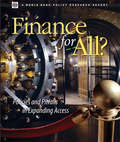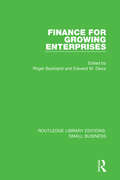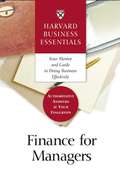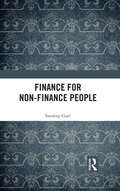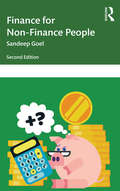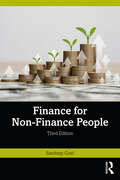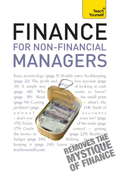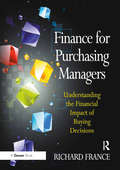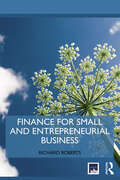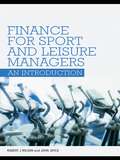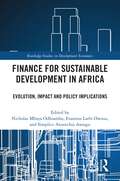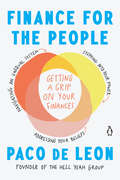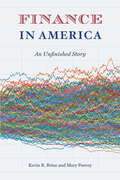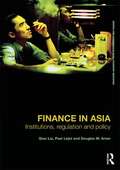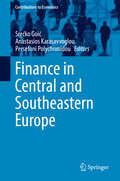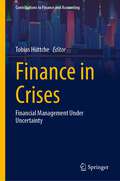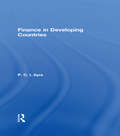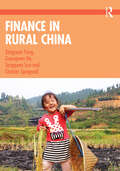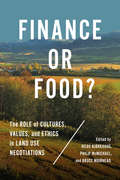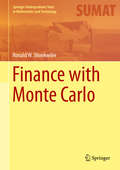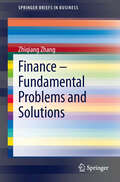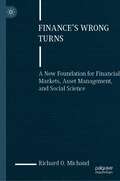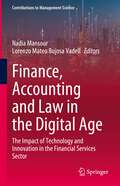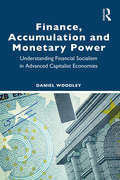- Table View
- List View
Finance for All? Policies and Pitfalls in Expanding Access
by World BankAccess to financial services varies sharply around the world. In many developing countries less than half the population has an account with a financial institution, and in most of Africa less than one in five households do. Lack of access to finance is often the critical mechanism for generating persistent income inequality, as well as slower growth. 'Finance for All?: Policies and Pitfalls in Expanding Access' documents the extent of financial exclusion around the world; addresses the importance of access to financial services for growth, equity and poverty reduction; and discusses policy interventions and institutional reforms that can improve access for underserved groups. The report is a broad ranging review of the work already completed or in progress, drawing on research utilizing data at the country, firm and household level. Given that financial systems in many developing countries serve only a small part of the population, expanding access remains an important challenge across the world, leaving much for governments to do. However, not all government actions are equally effective and some policies can be counterproductive. The report sets out principles for effective government policy on broadening access, drawing on the available evidence and illustrating with examples.
Finance for Growing Enterprises (Routledge Library Editions: Small Business)
by Roger Buckland Edward W. DavisThis volume, originally published in 1995, examines the mechanisms by which businesses that have the capacity to grow – whether in terms of output, innovation or export – acquire the cash that enables growth. Addressing an issue of central importance to the competitiveness of firms and economies, this book draws together research by leading academics in the area. Throughout, research studies develop the themes of market failure, finance gaps and failure of demand. They also bring out the linkages between the financing choices facing the growing firm and the issues of organisation and of corporate governance that have to be address during the process of growth and maturity. Contributors challenge financial orthodoxy throughout, providing coherent analyses of the difficulties faced in the finance of the growing enterprise, from its early dependence on banks and informal finance to the pinnacle of a stock exchange listing.
Finance for Managers
by Harvard Business School PressHarvard Business Essentials are comprehensive, solution-oriented paperbacks for business readers of all levels of experience. Calculating and assessing the overall financial health of the business is an important part of any managerial position. From reading and deciphering financial statements, to understanding net present value, to calculating return on investment, Finance for Managers provides the fundamentals of financial literacy. Easy to use and nontechnical, this helpful guide gives managers the smart advice they need to increase their impact on financial planning, budgeting, and forecasting.
Finance for Managers: Custom Text Version 2 (BUSN #5200)
by Joe Andrew Brad ScottContents of the book include: Introduction to Financial Management; Accounting--Present and Past; Financial Statements and Accounting Concepts/Principles; Financial Analysis; Budgeting fundamentals; The Time Value of Money; Capital Investment Decisions; and Appendix: Interest Tables.
Finance for Non-Finance People
by Sandeep GoelFinance is key to every business organization as well as outside. This book makes sense of the finance world from a non-finance perspective. It introduces, explains and demystifies essential ideas of business finance to those who do not have financial background or training. Lucid, accessible yet comprehensive, the book delineates the financial workings of businesses and offers an overview of corporate finance in the global context. The volume: Contains effective tools for financial communication, monitoring, analysis and resource allocation Provides important learning aids such as figures, tables, illustrations and case studies Highlights fundamental concepts and applications of finance Surveys global corporate practices, recent trends and current data A guide to building financial acumen, this book will be a useful resource for executive and management development programmes (EDPs & MDPs) oriented towards business managers, including executive MBA programmes. It will benefit business executives, corporate heads, entrepreneurs, government officials, teachers, researchers and students of management and business besides those who deal with finance or financial matters in their daily lives.
Finance for Non-Finance People
by Sandeep GoelFinance is key to every business organisation as well as outside. This book makes sense of the finance world from a non-finance perspective. It introduces, explains and demystifies essential ideas of business finance to those who do not have financial background or training. Lucid, accessible yet comprehensive, the book delineates the financial workings of businesses and offers an overview of corporate finance in the global context. The volume: Contains effective tools for financial communication, monitoring, analysis and resource allocation Provides important learning aids such as figures, tables, illustrations and case studies Highlights fundamental concepts and applications of finance Surveys global corporate practices, recent trends and current data This updated second edition contains new sections on Tax Planning, including Income Tax and Goods and Services Tax in India. A guide to building financial acumen, this book will be a useful resource for executive and management development programmes (EDPs & MDPs) oriented towards business managers, including MBA programmes. It will benefit business executives, corporate heads, entrepreneurs, government officials, teachers, researchers and students of management and business besides those who deal with finance or financial matters in their daily lives.
Finance for Non-Finance People
by Sandeep GoelThis book makes sense of the finance world from a non-finance perspective. It introduces, explains and demystifies essential ideas of business finance to those who do not have a financial background or training. The book delineates the financial workings of businesses and offers an overview of financial management in a global context. The volume: Discusses fundamental concepts and applications of accounting and finance at the global level Contains effective tools for financial analysis, communication, monitoring and resource allocation Provides important instructional aids such as figures, tables, illustrations and real-world corporate case studies to facilitate learning Is concise in form yet comprehensive in content, delivering in-depth coverage of the five key constituents and entire gamut of the finance domain – financial accounting, cost accounting, financial management, financial markets and tax planning Is thoroughly updated with the latest concepts, international corporate practices, recent trends and current data with a vivid visual impact for a pleasurable reading and learning experience. Lucid, accessible and comprehensive, this third edition is a revised version in accordance with the current finance laws, practices and data. A guide to building financial acumen and literacy, it will be a useful resource for executive and management development programmes (EDPs & MDPs) oriented towards business managers and management students, including MBA programmes, and allied disciplines of commerce, finance, economics and others. It will also benefit business executives, corporate heads, entrepreneurs, government officials, academicians of business and allied disciplines, as well as those who deal with finance or financial matters in their daily lives.
Finance for Non-Financial Managers: Teach Yourself (TY Business Skills)
by Roger MasonThe world of finance and accountancy can seem one of impenetrable mystery but it is one that many managers have to face in their day to day lives. With its comprehensive coverage of the subject, this book allows you not only to ask pertinent questions but also to understand the answers.Chapter by chapter, the workings of finance are mapped out and laid bare - the formal reports, the methods used to prepare the numbers and what accountants actually do every day.This edition is fully updated to reflect current allowances, rates and regulations and further information. It also includes even more questions (with comprehensive answers) to challenge the reader's understanding.Detailed explanations are provided in a clear, jargon-free style and backed up with lots of practical examples. Areas covered include:- basic terminology- accounting concepts and principles- profit & loss accounts and cash flow management- how accounts departments work- corporate financial planning.There is also a section on personal finance.NOT GOT MUCH TIME?One and five-minute introductions to key principles to get you started.AUTHOR INSIGHTSLots of instant help with common problems and quick tips for success, based on the author's many years of experience.TEST YOURSELFTests in the book and online to keep track of your progress.EXTEND YOUR KNOWLEDGEExtra online articles at www.teachyourself.com to give you a richer understanding of finance.THINGS TO REMEMBERQuick refreshers to help you remember the key facts.TRY THISInnovative exercises illustrate what you've learnt and how to use it.
Finance for Purchasing Managers: Understanding the Financial Impact of Buying Decisions
by Richard FranceManagers involved at a senior level in the purchasing function require very particular financial skills. They need to: analyse the financial health and stability of their suppliers; model different cost and price scenarios; understand and manage budgets; and be comfortable with the financial aspects of capital purchases. Finance for Purchasing Managers is written from this perspective using buyer's language and interpretation. Richard France explores four key areas of expertise required of a buyer in today's environment: Financial analysis of suppliers - this includes understanding the financial aspects of a buyer's own organisation plus analysing key suppliers and how to use information to gain a negotiating edge. Pricing, costing and cost modelling - including costing methods and their application and how an understanding of these can give buyers a greater understanding when dealing with supplier quotations. Managing resources - including budgeting and sources of finance. This shows how budgets are drawn up and the importance of understanding the implications of the buyer’s decisions on a supplier’s cash flow forecast. Finally, capital and revenue purchasing decisions and techniques - covering standard investment appraisal techniques and how these can be used for deciding on the best deal from a choice of suppliers for both capital items as well as a standard long term parts supply contract. Finance for Purchasing Managers may be used to support the CIPS Level 6 Course 'Finance for Purchasers' but also offers a readable and practical guide for those at a senior level in purchasing whether in the public or private sector.
Finance for Small and Entrepreneurial Business (Routledge Masters in Entrepreneurship)
by Richard RobertsThe financial environment of small and entrepreneurial firms is changing rapidly and is a topic where significant disagreement remains amongst researchers and policy advisers. This concise textbook provides a comprehensive overview of the current and projected trends in this market for the benefit of students of entrepreneurship at an advanced level. Written by an expert on SME finance, it provides a straightforward review of the external funding choices faced by small business owners, drawing on a range of new data sources which have emerged in recent years, along with a range of case studies. In addition, it includes an analysis of longer term trends and the role of the changing phases of the business cycle to equip readers to better understand the wider market environment both now and in the future. Roberts provides students of entrepreneurship with everything they need to know to excel in understanding the financial environment and its effect on small business.
Finance for Sport and Leisure Managers: An Introduction
by Robert Wilson John JoyceSport and leisure managers need to understand the financial side of their industry to offer the most cost-effective facilities and to make sound business decisions. However, to the non-expert the language and practice of finance is often bewildering and perceived as complicated, difficult and impenetrable. This textbook guides the reader throu
Finance for Sustainable Development in Africa: Evolution, Impact and Policy Implications (Routledge Studies in Development Economics)
by Nicholas Mbaya Odhiambo Erasmus Larbi Owusu Simplice Anutechia AsonguAlthough a number of selected African countries have made efforts to implement various financial sector reforms, many countries have not fully implemented the requisite reforms required for sustainable development. Instead, they have focused mainly on bank-based financial reforms, thereby neglecting market-based financial reforms. This study provides a one-stop shop for understanding the history and evolution of the financial sector in Africa with a special focus on the sub-Saharan region where the financial system in many countries is still at a relatively nascent stage. The analysis is extensive and robust, and starts from financial repression to financial liberalisation (both internal and external), and its role in sustainable development and poverty alleviation. The book covers a range of important research issues pertaining to financial development in selectede African countries, including interest rate and exchange rate reforms, the dynamics of bank-based and market-based financial development; the role of the informal financial sector in sustainable development; the finance-growth nexus; bank-based versus market-based financial sectors in Africa; financial development and information and communication technology; and financial development and gender equality, among other topics. The book also considers the relationship between the COVID-19 global pandemic and financial development, and concludes by presenting a forecast of the future trends of financial and sustainable development on the African continent in general and sub-Saharfan Africa in particular. The chapters are authored by prominent scholars and researchers in the field of finance and banking, applied econometrics and development economics, with a deep understanding and knowledge of financial development and the local situations in African countries. This book provides crucial reference material for academics, researchers, policymakers and students of all levels and is a must-read for anyone wishing to understand the nature of finance and sustainable development in Africa in relation to the rest of the world. It covers African countries, but with more emphasis on the sub-Saharan African region where the financial systems in many of the countries are still relatively underdeveloped.
Finance for the People: Getting a Grip on Your Finances
by Paco de LeonAn illustrated, practical guide to navigating your financial life, no matter your financial situationWe are all weird about money. Whether you have a lot or a little, your feelings and beliefs about money have been shaped by a combination of silence (or even shame) around talking about money, personal experiences, family and societal expectations, and a whole big complex system rigged against many of us from the start. Begin with that baseline premise and it&’s no surprise so many of us find it so difficult to save enough money (but way too easy to get trapped in ballooning credit card debt), emotionally draining to deal with student loans, and nearly impossible to understand the esoteric world of investing. Unlike most personal finance books that focus on skills and behaviors, FINANCE FOR THE PEOPLE asks you to examine your beliefs and experiences around money—blending extremely practical exercises with mindfulness, and including more than 50 illustrations and diagrams to make the concepts accessible (and even fun). With deep insider expertise from years spent in many different corners of the financial industry, Paco de Leon is a friendly, approachable, and wise guide who invites readers to change their relationship with money. With her holistic approach you&’ll learn how to: • root out your unconscious beliefs about money • untangle the mental and emotional burden of student loans to pay them off • use a gratitude practice to help you think differently about spending • break out of the debt cycle and begin building wealth This book is for anyone who feels unseen, ignored, or bored to death by the way personal finances are approached and taught, and is ready to go on a journey of self-discovery and step into their financial power.
Finance in America: An Unfinished Story
by Kevin R. Brine Mary PooveyThe economic crisis of 2008 led to an unprecedented focus on the world of high finance—and revealed it to be far more arcane and influential than most people could ever have imagined. Any hope of avoiding future crises, it’s clear, rest on understanding finance itself. To understand finance, however, we have to learn its history, and this book fills that need. Kevin R. Brine, an industry veteran, and Mary Poovey, an acclaimed historian, show that finance as we know it today emerged gradually in the late nineteenth century and only coalesced after World War II, becoming ever more complicated—and ever more central to the American economy. The authors explain the models, regulations, and institutions at the heart of modern finance and uncover the complex and sometimes surprising origins of its critical features, such as corporate accounting standards, the Federal Reserve System, risk management practices, and American Keynesian and New Classic monetary economics. This book sees finance through its highs and lows, from pre-Depression to post-Recession, exploring the myriad ways in which the practices of finance and the realities of the economy influenced one another through the years. A masterwork of collaboration, Finance in America lays bare the theories and practices that constitute finance, opening up the discussion of its role and risks to a broad range of scholars and citizens.
Finance in Asia: Institutions, Regulation and Policy (Routledge Advanced Texts in Economics and Finance)
by Douglas W. Arner Qiao Liu Paul LejotAsia’s demand for second-generation financial institutions and markets needs to be met in order for the region’s further development to be sustained. This book provides a compelling, fact-based assessment of current practices and regulations in Asia’s financial institutions and markets and carefully documents the exciting opportunities and challenges that lie ahead in the region’s financial systems. This book differs in design from typical treatments of financial institutions and markets because its focus is on Asia rather than using the US model (in terms of market configurations or products) as a benchmark, and its takes a contemporary and forward-looking view of financial markets. Examples of practice from Asia are used to illustrate major accepted themes in finance and financial regulation. To the extent that Asia’s main economies share characteristics that are distinct, for example, in the relationship between government and the banking sector, or in aspects of corporate governance, the book will discuss the consequences for market operation and intermediation. The book’s carefully structured facts and rigorously argued analysis carry important implications both for students in business and law and for professionals new to financial markets in Asia. It will change the way that Asian financial markets and institutions is taught in universities as well as provide a valuable resource for professionals working in finance in Asia.
Finance in Central and Southeastern Europe
by Anastasios Karasavvoglou Persefoni Polychronidou Srećko GoićThis book describes specific problems and proposes solutions for different areas of finance in Central and Southeastern European countries. Covering a broad spectrum of topics, from monetary economics and electronic money to capital markets, banking and insurance, it comprises theoretical and empirical contributions by authors from nine countries - Poland, Slovakia, Croatia, Bosnia and Herzegovina, Romania, Bulgaria, Montenegro, Serbia and Greece. Intended for academics as well as policy makers and practitioners it offers new perspectives on Central and Southeastern European finance research.
Finance in Crises: Financial Management Under Uncertainty (Contributions to Finance and Accounting)
by Tobias HüttcheClimate change, COVID-19, Ukraine: it seems that crises are here to stay, which poses major challenges for the financial management of companies. This book addresses these issues, and present concrete approaches to resolving them.Until recently, the past was considered a reliable basis for predicting the future. As this is no longer the case, financial calculation and management models must take uncertainty into account. This affects the entire discipline of financial management, whether it is the valuation of goodwill in accounting, the estimation of capital costs in company valuation, or the strategic controlling of an international group of companies. There are three main challenges to be overcome: first, uncertainty must be integrated into traditional models, then uncertainty must be quantified, and lastly, potential developments must be modelled. This requires not only a deep understanding of the respective field, but also the ability to suitably adapt traditional models and techniques. This volume discusses these issues and offers new insights into how financial management will evolve in light of the current developments.
Finance in Developing Countries
by P.C.I. AyreFirst Published in 1977. This issue of the Journal is devoted to papers dealing with various features of the financial process in developing countries progress. While the majority of papers included deal with various aspects of the domestic financial system, a paper is included which lies in the field of international finance and there are two papers within the field of public finance as conventionally defined.
Finance in Rural China
by Xingyuan Feng Christer Ljungwall Guangwen He Tongquan SunThis book offers insights into the scholarly debates on formal and informal finance in rural China and fills a gap in the existing literature. The book provides an overview of the overall development of rural finance in China and explains the necessity of embarking on the pathway toward rural financial pluralization through the "Local Knowledge Paradigm". The authors also analyze formal and informal financial development and inclusive finance (including digital inclusive finance) in rural China in various dimensions. This book aids the understanding of the structure of the rural financial system and the operations of rural financial service providers in China. It will be a useful reference for those researching and interested in rural economy and rural finance.
Finance or Food?: The Role of Cultures, Values, and Ethics in Land Use Negotiations
by Philip McMichael Hilde Bjørkhaug Bruce MuirheadExploring the ways in which culture, systems of value, and ethics impact agriculture, this volume addresses contemporary land questions and conditions for agricultural land management. Throughout, the editors and contributors consider a range of issues, including pressure on farmland, international and global trade relations, moral and ethical questions, and implications for governance. The focus of Finance or Food? is land use in Australia, Canada, and Norway, chosen for their commonalities as well as their differences. With reference to these specific national contexts, the contributors explore political, ecological, and ethical debates concerning food production, alternative energy, and sustainability. The volume argues that recognition of food, finance, energy, and climate crises is driving investments and reframing the strategies of development agencies. At the same time, food producers, small farmers, and pastoralists facing eviction from their land are making their presence felt in this debate, not just locally, but in national policy arenas and international fora as well. This volume investigates the many ways in which this process is occurring and draws out the cultural implications of new developments in global land use. An important intervention into a timely debate, Finance or Food? will be essential reading for both academics and policymakers.
Finance with Monte Carlo
by Ronald W. ShonkwilerThis text introduces upper division undergraduate/beginning graduate students in mathematics, finance, or economics, to the core topics of a beginning course in finance/financial engineering. Particular emphasis is placed on exploiting the power of the Monte Carlo method to illustrate and explore financial principles. Monte Carlo is the uniquely appropriate tool for modeling the random factors that drive financial markets and simulating their implications. The Monte Carlo method is introduced early and it is used in conjunction with the geometric Brownian motion model (GBM) to illustrate and analyze the topics covered in the remainder of the text. Placing focus on Monte Carlo methods allows for students to travel a short road from theory to practical applications. Coverage includes investment science, mean-variance portfolio theory, option pricing principles, exotic options, option trading strategies, jump diffusion and exponential Lévy alternative models, and the Kelly criterion for maximizing investment growth. Novel features: inclusion of both portfolio theory and contingent claim analysis in a single text pricing methodology for exotic options expectation analysis of option trading strategies pricing models that transcend the Black-Scholes framework optimizing investment allocations concepts thoroughly explored through numerous simulation exercises numerous worked examples and illustrations The mathematical background required is a year and one-half course in calculus, matrix algebra covering solutions of linear systems, and a knowledge of probability including expectation, densities and the normal distribution. A refresher for these topics is presented in the Appendices. The programming background needed is how to code branching, loops and subroutines in some mathematical or general purpose language. The mathematical background required is a year and one-half course in calculus, matrix algebra covering solutions of linear systems, and a knowledge of probability including expectation, densities and the normal distribution. A refresher for these topics is presented in the Appendices. The programming background needed is how to code branching, loops and subroutines in some mathematical or general purpose language. Also by the author: (with F. Mendivil) Explorations in Monte Carlo, ©2009, ISBN: 978-0-387-87836-2; (with J. Herod) Mathematical Biology: An Introduction with Maple and Matlab, Second edition, ©2009, ISBN: 978-0-387-70983-3.
Finance – Fundamental Problems and Solutions
by Zhiqiang ZhangAs indicated by the title, this book focuses on fundamental problems in finance: a logical dilemma in valuation, stock valuation methods/models, risk valuation, and optimal capital structure. It presents an innovative approach to logic and quantitative reasoning (without advanced mathematics) that delivers valuable results ---- convincing solutions to these problems. Readers in finance will definitely be interested in these solutions as well as the methods. In fact, these fundamental problems are essential in the field of finance, and they have remained unsolved (or partly unsolved) for decades. The solutions offered in this book are all sound in theory and feasible in practice, and will hopefully benefit both theoretic al research and practical decision-making.
Finance's Wrong Turns: A New Foundation for Financial Markets, Asset Management, and Social Science
by Richard O. MichaudThere is a foundational crisis in financial theory and professional investment practice: There is little, if any, credible evidence that active investment strategies and traditional institutional quantitative technologies are able to provide superior risk-adjusted, cost-adjusted return over investment relevant horizons. Economic and financial theory has been in error for more than fifty years and is the fundamental cause of the persistent ineffectiveness of professional asset management. Contemporary sociological and economic theory, agent-based modeling, and an appreciation of the social context for preference theory provides a rational and intuitive framework for understanding financial markets and economic behavior. The author narrates his long-term experience in the use and limitations of traditional tools of quantitative asset management as an institutional asset manager in practice and as a quantitative analyst and strategist on Wall Street. Monte Carlo simulation methods, modern statistical tools, and U.S. patented innovations are introduced to redefine portfolio optimality and procedures for enhanced professional asset management. A new social context for expected utility theory leads to a novel understanding of modern equity markets as a financial intermediary for purchasing power constant time-shift investing uniquely appropriate for meeting investor long-term investment objectives. This book addresses the limitations and indicated resolutions for more useful financial theory and more reliable asset management technology. In the process, it traces the major historical developments of theory and institutional asset management practice and their limitations over the course of the 20th century to the present, including Markowitz and the birth of modern finance, CAPM theory and emergence of institutional quantitative asset management, CAPM and VM theory limitations and ineffective iconic tools and strategies, and innovations in statistical methodologies and financial market theory.
Finance, Accounting and Law in the Digital Age: The Impact of Technology and Innovation in the Financial Services Sector (Contributions to Management Science)
by Nadia Mansour Lorenzo Mateo Bujosa VadellThis book focuses on understanding Innovation in the Financial Services Sector. The collection of contributions gathered in the book highlights the importance of technology contexts that pertain to Finance, accounting, and the law arena. The respective chapters address topics such as Economic development, social entrepreneurship, Online Behaviour, Digital entrepreneurship, and Islamic banks. All contributions are based on the latest empirical and theoretical research and provide key findings and concrete recommendations for scholars, entrepreneurs, organizations, and policymakers.
Finance, Accumulation and Monetary Power: Understanding Financial Socialism in Advanced Capitalist Economies
by Daniel WoodleyThis accessible yet rigorous book examines the development of ‘financial socialism’ in advanced capitalist economies in the decade since the global financial crisis of 2007–2009. This new term refers to an attempt to resolve the accumulation crisis of capital through coordinated central bank activism, where state circuits of monetary capital assume a critical role in the reproduction of capitalist social relations. The book explains the dynamics of the crisis as it has developed and assesses the response of monetary elites to systemic financial risk in the global economy. Their failure to re-engineer growth following the technology boom of the late 1990s and the global financial crisis are driving fundamental changes in the form and function of capitalist money, which have yet to be theorized adequately. Finance, Accumulation and Monetary Power presents a revealing and radical critique of the failure of the International Political Economy to apprehend changes taking place within capitalism, employing a critical-theoretical analysis of contradictions in the capitalist reproduction scheme. The book will be of key interest to scholars, students and readers of international political economy, critical political economy, heterodox economics, globalization, international relations, international political sociology, business studies and finance.
